Ditapis dengan

Lectures on Calvinism
- Edisi
- 1
- ISBN/ISSN
- 080281607X
- Deskripsi Fisik
- vii, 199 hal
- Judul Seri
- -
- No. Panggil
- 230.42 K95l
- Edisi
- 1
- ISBN/ISSN
- 080281607X
- Deskripsi Fisik
- vii, 199 hal
- Judul Seri
- -
- No. Panggil
- 230.42 K95l
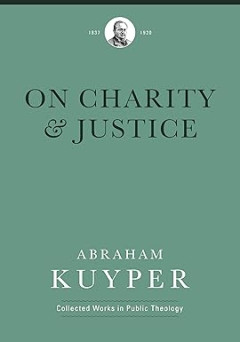
Charity & Justice, On
Outline : The practical outworking of Kuyper's doctrine of common grace demanded a commitment to seeking Christ's glory in every sphere of human life. Christians are called to witness to the lordship of Christ through sacrificial service, not domination, and such service calls us to seek charity and justice for all people. In this anthology of articles and reflections, Kuyper articulates a Chri…
- Edisi
- -
- ISBN/ISSN
- 9781577996736
- Deskripsi Fisik
- 415 hal
- Judul Seri
- -
- No. Panggil
- 241 K9696c

Pro Rege : Living Under Christ's Kingship : Volume 3 : The Kingship of Christ…
Outline : Abraham Kuyper believed that Jesus is King of all creation, making it absurd to distinguish between Christian life inside and outside the church. In previous volumes of Pro Rege, Kuyper examined Christ's universal kingship and its implications for the life of the church and the family; in this third volume, he extends his analysis of Christ's kingship and rule to areas of society not …
- Edisi
- -
- ISBN/ISSN
- 9781577996729
- Deskripsi Fisik
- 500 hal
- Judul Seri
- -
- No. Panggil
- 232 K959p v.3
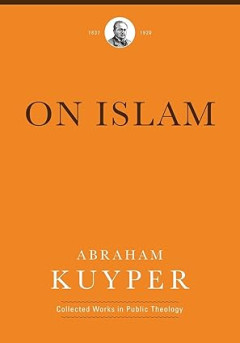
Islam, On
Outline : At the beginning of the twentieth century, famed theologian Abraham Kuyper toured the Mediterranean world and encountered Islam for the first time. Part travelogue, part cultural critique, On Islam presents a European imperialist seeing firsthand the damage colonialism had caused and the value of a religion he had never truly understood. Here, Kuyper's doctrine of common grace shines …
- Edisi
- -
- ISBN/ISSN
- 9781577996743
- Deskripsi Fisik
- 363 hal
- Judul Seri
- -
- No. Panggil
- 297 K9696i
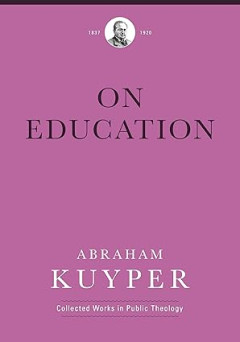
Education, On
Outline : Among Abraham Kuyper's many accomplishments was his founding of the Free University of Amsterdam, where he also served as president and professor of theology. This collection of essays and speeches presents Kuyper's theology and philosophy of education, and his understanding of the divine purpose of scholarship for human culture. Included are convocation addresses given at the Free Un…
- Edisi
- -
- ISBN/ISSN
- 9781577996774
- Deskripsi Fisik
- 429 hal
- Judul Seri
- -
- No. Panggil
- 277.3 K9696e
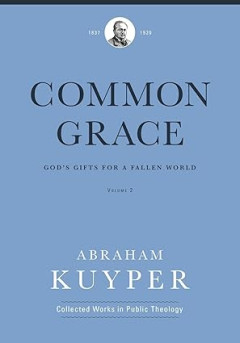
Common Grace : God's Gifts for a fallen world : Volume 2 : The Doctrinal Section
Outline : Common Grace is often considered Abraham Kuyper's crowning work, an exploration of how God expresses grace even to the unsaved. Kuyper firmly believed that though many people in the world will remain unconverted, God's grace is still shown to the world as a whole. The second volume of Common Grace contains Kuyper's doctrinal exploration of the impact and implications of this aspect of…
- Edisi
- -
- ISBN/ISSN
- 9781577996699
- Deskripsi Fisik
- 811 hal
- Judul Seri
- -
- No. Panggil
- 234 K959c v.2
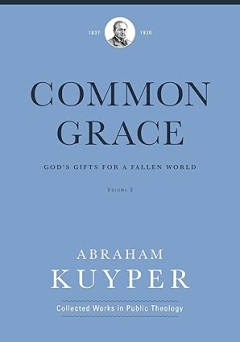
Common Grace : God's gifts for a fallen world - Volume 3 : The Practical Section
Outline : Common Grace is often considered Abraham Kuyper's crowning work, an exploration of how God expresses grace even to the unsaved. Kuyper firmly believed that though many people in the world will remain unconverted, God's grace is still shown to the world as a whole. In this third and final volume of Common Grace, Kuyper brings his argument to its logical completion by turning to practic…
- Edisi
- -
- ISBN/ISSN
- 978-1-57799-670-5
- Deskripsi Fisik
- 654 hal
- Judul Seri
- -
- No. Panggil
- 234 K959c v.3
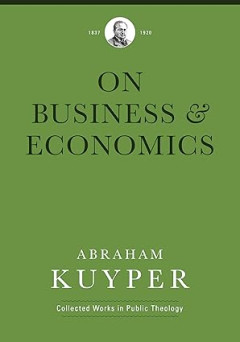
Business & Economics, On
Outline: In his vast treasury of writings, Abraham Kuyper addressed nearly every sphere of society, including politics, science, and the arts. But his views on business and economics are often overlooked because he rarely engaged with that sphere directly. Still, his doctrine of common grace has great significance for showing how Christ is at work in the workplace. In this anthology of essays, …
- Edisi
- -
- ISBN/ISSN
- 9781577996767
- Deskripsi Fisik
- 429 hal
- Judul Seri
- -
- No. Panggil
- 261.85 K9696b
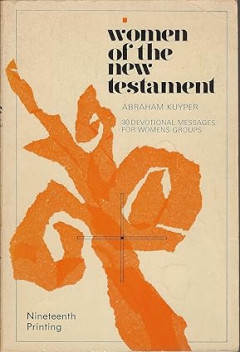
Women of the New Testament: 30 Devotional Messages for womens groups
- Edisi
- Twenty Ninth Edition
- ISBN/ISSN
- 0-310-36751-4
- Deskripsi Fisik
- 111 hal
- Judul Seri
- -
- No. Panggil
- 221.92 K9696w
- Edisi
- Twenty Ninth Edition
- ISBN/ISSN
- 0-310-36751-4
- Deskripsi Fisik
- 111 hal
- Judul Seri
- -
- No. Panggil
- 221.92 K9696w

Women of the Old Testament : 50 Devotional messages for womens groups
- Edisi
- Twenty Seventh Edition
- ISBN/ISSN
- 0-310-36761-1
- Deskripsi Fisik
- 176 hal
- Judul Seri
- -
- No. Panggil
- 221.92 K9696w
- Edisi
- Twenty Seventh Edition
- ISBN/ISSN
- 0-310-36761-1
- Deskripsi Fisik
- 176 hal
- Judul Seri
- -
- No. Panggil
- 221.92 K9696w

Penginjilan Pribadi
- Edisi
- -
- ISBN/ISSN
- -
- Deskripsi Fisik
- -
- Judul Seri
- -
- No. Panggil
- 269.2 Su772p
- Edisi
- -
- ISBN/ISSN
- -
- Deskripsi Fisik
- -
- Judul Seri
- -
- No. Panggil
- 269.2 Su772p

Legend of the Septuagint, The : From Classical Antiquity to Today
Outline: The Septuagint is the most influential of the Greek versions of the Torah, the first five books of the Hebrew Bible. The exact circumstances of its creation are uncertain, but different versions of a legend about the miraculous nature of the translation have existed since antiquity. Beginning in the Letter of Aristeas, the legend describes how Ptolemy Philadelphus (285-247 B.C.E.) comm…
- Edisi
- First Edition
- ISBN/ISSN
- 978-0-521-85495-5
- Deskripsi Fisik
- 334 hal
- Judul Seri
- -
- No. Panggil
- 221.4809 W284l c.1

Hezekiah and the Dialogue of Memory
Outline: A king refracted through crisis and dispute - Examining the different accounts of Hezekiah's reign in 2 Kings, 2 Chronicles, and Isaiah, Song-Mi Suzie Park describes a "Hezekiah complex" in which the king served as a symbol for the vicissitudes of Judah's history, as a positive reformer of the "pagan" ways of the country, or as a sinner, at least partly responsible for the threats and …
- Edisi
- -
- ISBN/ISSN
- 978-1-4514-8522-6
- Deskripsi Fisik
- 318
- Judul Seri
- Emerging Scholars
- No. Panggil
- 222.54092 P2351h c.1

Voice of God in the Text of Scripture, The : Explorations in Constructive Dog…
Outline : How does the voice of God come to us in the text of scripture? Scholars from biblical studies and theology have recently been engaged in various ways in the project of theological interpretation of Scripture. Their work has raised issues about the theological content of the biblical material. authorial intention, the reception and formation of the Bible as Christian Scripture, the imp…
- Edisi
- -
- ISBN/ISSN
- 978-0310527763
- Deskripsi Fisik
- 208
- Judul Seri
- -
- No. Panggil
- 230 C868v

Mendekat kepada Allah : Renungan Harian yang Disesuaikan untuk Orang-orang Kr…
- Edisi
- First Edition
- ISBN/ISSN
- 9789793292823
- Deskripsi Fisik
- 239
- Judul Seri
- -
- No. Panggil
- 242 K95m
- Edisi
- First Edition
- ISBN/ISSN
- 9789793292823
- Deskripsi Fisik
- 239
- Judul Seri
- -
- No. Panggil
- 242 K95m

Third World Theologies : Commonalities & Divergences : Papers and Reflections…
Outline: Third World theology has grown and developed over the past decade - largely due to the efforts and activities of the Ecumenical Association of Third World Theologians (EATWOT). The present volume, arising from their Second General Assembly, is an ideal introduction to this emerging movement, exploring both the common bonds that unite Third World theologies and the distinctive elements …
- Edisi
- -
- ISBN/ISSN
- 0-88344-681-2
- Deskripsi Fisik
- 216
- Judul Seri
- -
- No. Panggil
- 230.091724 Ab821t c.1

Our Program : A Christian Political Manifesto
Outline: In this book, the author makes a comprehensive effort to counter the secular politics of his day with a Christian alternative. In an era where the church usually either controlled or was controlled by the state, the author showed that it was possible to frame a political program in which church and state engage while remaining separate. Though couched in its particular time and plac…
- Edisi
- -
- ISBN/ISSN
- 978-1-57799-655-2
- Deskripsi Fisik
- 410
- Judul Seri
- -
- No. Panggil
- 949.205092 K959o

Neo-Calvinism and Christian Theosophy
Outline: A Christian worldview, the idea of sphere soverignty, opposition to the autonomy of thought, a Free University, our supratemporal selfhood - these and other key ideas of neo-Calvinism all find their source in the Christian theosophy of Franz von Baader. This book traces the history of these ideas from Baader to Chantepie de la Saussaye to Gunning to Kuyper and to Dooyeweerd.
- Edisi
- -
- ISBN/ISSN
- 9780994775108
- Deskripsi Fisik
- 588
- Judul Seri
- -
- No. Panggil
- 234 F915n

Aldersgate and Athens : John Wesley and the foundations of Christian Belief
Outline: In his day, John Wesley offered Important insights on how to obtain knowledge of God, insights readily bear fruit in our own times. As premiere Wesleyan scholar the author shows, Wesley's most famous spiritual experience is rife with philosophical significance and implications. Throughout, the author brings Wesley's works into fruithful conversation with some of the most important wo…
- Edisi
- -
- ISBN/ISSN
- 978-160258246-0
- Deskripsi Fisik
- 98
- Judul Seri
- -
- No. Panggil
- 287.092 Ab821a

History of Biblical Israel, The
Outline: The history of Israel of the Bible remains one of the most holy contested issues in scholarship of the Hebrew Bible today. One of the clearest voices in the debate is that of the author. In the pages of this volume the author distills years of writing on the history of Israel from its beginnings up to the destruction of the First Temple of Jerusalem (586 B.C.E.). The author divides …
- Edisi
- -
- ISBN/ISSN
- 0-391-04220-3
- Deskripsi Fisik
- 476
- Judul Seri
- -
- No. Panggil
- 933 M291h

The Church, On
Overview: This book contains seven of the author's essential works on the church as it relates to its surrounding culture. Here, the great pastor, theologians, and political lays out the vital mission of the church in the world. These essays call today's Christians to recapture the true calling of the worldwide church: It must be a living and life-giving, yet organized and established, church, …
- Edisi
- -
- ISBN/ISSN
- 9781577996750
- Deskripsi Fisik
- 495
- Judul Seri
- -
- No. Panggil
- 262.9 K959t

Pro Rege : Living under Christ the King - Volume 2 : The Kingship of Christ i…
Outline: The author believed that it was absurd to distinguish between Christian life inside and outside the church. Because Jesus is King of creation, Christians should honor him by advancing his rule in all spheres, both within and outside of church walls. In this volume of this book, the author examines how Christ's kingdom should be visible in the life of the church and the Christian home. …
- Edisi
- -
- ISBN/ISSN
- 978-1-49514-065-5
- Deskripsi Fisik
- 488
- Judul Seri
- -
- No. Panggil
- 232 K959p v.2

Chongshin Review : Volume 12, February 2007
- Edisi
- -
- ISBN/ISSN
- 1226-3788
- Deskripsi Fisik
- 164
- Judul Seri
- Chongshin Review
- No. Panggil
- R 050 Jou P920c v.12
- Edisi
- -
- ISBN/ISSN
- 1226-3788
- Deskripsi Fisik
- 164
- Judul Seri
- Chongshin Review
- No. Panggil
- R 050 Jou P920c v.12

Common Grace : God's gifts for a fallen world - Volume 1 : The Historical Sec…
Outline: In this book the author presents a constructive public theology of cultural engagement rooted in the humanity Christians share with the rest of the world. He addresses a gap in the development of Reformed teaching on divine grace, and he articulates a Reformed understanding of God's gifts that are common to all people after the fall into sin. The first volume contains the author's demo…
- Edisi
- -
- ISBN/ISSN
- 978-1-57-799653-8
- Deskripsi Fisik
- 632
- Judul Seri
- -
- No. Panggil
- R 234 K959c v.1

Pro Rege : Living under Christ's Kingship - Volume 1 : The Exalted Nature of …
Outline: The author wrote this book to show how Christ's kingship affects all of life. The author saw Christ's kingship being diminished, undermined, and obscured by the kingdom of Satan - particularly as believer's lives inside the church became distanced from their lives outside. By first diagnosing the ills of his culture, then laying out the implications of Jesus's kingship, the author show…
- Edisi
- -
- ISBN/ISSN
- 978-1-57-799654-5
- Deskripsi Fisik
- 507
- Judul Seri
- -
- No. Panggil
- R 232 K959p v.1

Crossing the Threshld of Divine Revelation
- Edisi
- -
- ISBN/ISSN
- 0-8208-2958-9
- Deskripsi Fisik
- 198
- Judul Seri
- -
- No. Panggil
- 230.01 Ab821c
- Edisi
- -
- ISBN/ISSN
- 0-8208-2958-9
- Deskripsi Fisik
- 198
- Judul Seri
- -
- No. Panggil
- 230.01 Ab821c

Scholarship : Two Convocation Addresses on University Life
Overview: More than a hundred years ago the author and his followers recognized that knowledge (curriculum) and behavior (pedagogy) are embedded in everyone's core beliefs about the nature of God, humanity, and the world. The author delivered the two convocation addresses included in this volume to the students of the Vrije Universiteit (Free University) in Amsterdam in 1889 and 1900. A long …
- Edisi
- -
- ISBN/ISSN
- 978-1-938948-85-5
- Deskripsi Fisik
- 51
- Judul Seri
- -
- No. Panggil
- 370 K959s

Work of the Holy Spirit, The
Overview: After three-quarters of a century, the author's exhaustive study of the work of Holy Spirit - now available for the first time in a paperback edition - still stands undiminished as a comprehensive Protestant statement about a central but much-misunderstood part of the Christian faith. "I have made an effort," the author writes in his preface, "to represent the work of the Holy Spirit…
- Edisi
- Second Edition
- ISBN/ISSN
- 0-8028-8156-4
- Deskripsi Fisik
- 664
- Judul Seri
- -
- No. Panggil
- 231.3 K959w

Letters to the Thessalonians, The : A New Translation with introduction and c…
Overview: In A.D. 49, Paul traveled to Thessalonica, a major city in northern Greece, to preach the gospel. A small group of manual laborers responded positively to his message, resulting in the formation of a church. After spending less than three monts with his converts, Paul left the city for southern Greece, ending up in Corinth, from where he wrote two letters to the Thessalonians four m…
- Edisi
- -
- ISBN/ISSN
- 978-0-300-13948-6
- Deskripsi Fisik
- 508
- Judul Seri
- The Anchor Yale Bible Volume 32B
- No. Panggil
- 227'.81077 M294l

Silsilah di Kitab Kejadian : Dilihat dari Sudut Pandang Penyelenggaraan Sejar…
- Edisi
- -
- ISBN/ISSN
- 9789790812352
- Deskripsi Fisik
- 277
- Judul Seri
- -
- No. Panggil
- 222.1106 P215s
- Edisi
- -
- ISBN/ISSN
- 9789790812352
- Deskripsi Fisik
- 277
- Judul Seri
- -
- No. Panggil
- 222.1106 P215s

Practice of Godliness, the.
- Edisi
- -
- ISBN/ISSN
- 9780802839510
- Deskripsi Fisik
- 121
- Judul Seri
- -
- No. Panggil
- 284.2 Kuy p
- Edisi
- -
- ISBN/ISSN
- 9780802839510
- Deskripsi Fisik
- 121
- Judul Seri
- -
- No. Panggil
- 284.2 Kuy p
 Karya Umum
Karya Umum  Filsafat
Filsafat  Agama
Agama  Ilmu-ilmu Sosial
Ilmu-ilmu Sosial  Bahasa
Bahasa  Ilmu-ilmu Murni
Ilmu-ilmu Murni  Ilmu-ilmu Terapan
Ilmu-ilmu Terapan  Kesenian, Hiburan, dan Olahraga
Kesenian, Hiburan, dan Olahraga  Kesusastraan
Kesusastraan  Geografi dan Sejarah
Geografi dan Sejarah